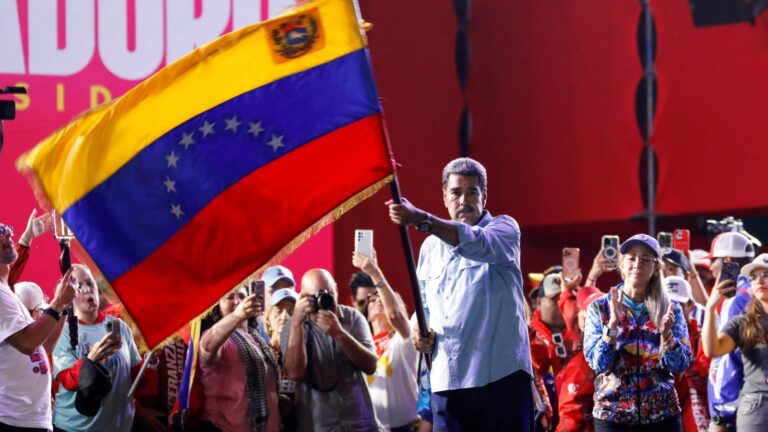Venezuela goes to the polls on Sunday in what is expected to be the most closely watched presidential election in the country’s modern history.
Opposition supporters believe they have a real chance of ousting incumbent President Nicolas Maduro, who is seeking a third term after 11 years in power.
Maduro faces a major challenge in the election against opposition candidate Edmundo Gonzalez Urrutia. His presidency is in crisis, and voters must decide whether to re-elect him or give the opposition a chance to reverse the policies of his party that have led to the collapse of the economy and the exodus of millions.
Interestingly, the election coincides with the birthday of Maduro’s mentor, the late Venezuelan President Hugo Chavez. Here’s everything you need to know about Venezuela’s presidential election.
Who is Nicolas Maduro?
Nicolas Maduro inherited power in Venezuela after the death of popular socialist Hugo Chavez, who was battling cancer, and named Maduro interim president. Maduro took office in March 2013 and won a closely contested presidential election the following month.
Maduro was re-elected in 2018 in elections that were widely criticized as fraudulent. His government banned Venezuela’s most popular opposition parties and politicians from participating in the elections, and the opposition called for a boycott of the elections, accusing them of lacking a fair electoral process.
Under Maduro’s rule, both his own popularity and that of his United Socialist Party of Venezuela have plummeted as the country faces an economic crisis exacerbated by falling oil prices, corruption and mismanagement.
Once boasting the world’s largest oil reserves and Latin America’s most advanced economy, Venezuela has been in crisis since Maduro’s rise to power, facing plummeting oil prices, widespread shortages and hyperinflation of more than 130,000 percent, leading to social unrest and mass migration.
Sanctions imposed by the Trump administration, aimed at ousting President Maduro after his 2018 reelection, have made the situation worse.
Maduro’s coalition controls 256 of the 277 seats in Venezuela’s legislative body, the National Assembly. This near-total control gives his regime control over other key institutions, including Venezuela’s Supreme Court and the National Electoral Commission (CNE), which is in charge of running elections.
Maduro still relies on a loyal base of support known as Chavistas, including millions of civil servants and contractors, but as the economy continues to deteriorate, his ability to leverage social security programs to secure votes is weakening.
Opponents
The other is Gonzalez, who represents the opposition coalition’s Unity Platform and was selected in April as a last-minute replacement for opposition leader Maria Corina Machado, who had been barred from running for any public office for 15 years by the Maduro-controlled Supreme Court of Justice.
Machado, a former lawmaker, won more than 90% of the vote in the opposition primary in October.
But after being blocked from taking part in the presidential race, she initially chose a university professor as her replacement.
The National Electoral Commission also blocked the registration of this replacement candidate, meaning that political newcomer Gonzalez, a former diplomat, was elected.
Despite their diverse political views, the Unity Platform coalition is united in their core goal of ending Maduro’s term in office and improving ties with the West.
The coalition’s goals are to secure the lifting of sanctions, promote investment to improve the situation in Venezuela, and allow people living abroad to return home.
Maduro’s government has defended its actions, accusing opposition figures like Machado of plotting to overthrow the government and supporting U.S. sanctions against Venezuela.
President Maduro sees the opposition as pawns of foreign powers and claims they are privatizing the social security system that many poor people rely on for their livelihoods.
How were their campaigns different?
Venezuela’s election has highlighted a stark disparity between the leading candidates, especially when it comes to funding. The contrast became even more pronounced on Thursday during the final day of campaigning.
Maduro appeared before his supporters on a large stage in one of the city’s main thoroughfares, where the rally included musical interludes and dance breaks during his speech.
Maduro has portrayed himself as a pacifist while accusing his opponents of promoting violence, particularly at a July 17 election rally where he warned of the risk of bloodshed if the opposition won.
The comments drew condemnation from world leaders, including Brazilian President Luiz Inacio Lula da Silva, who warned Maduro against anti-democratic actions.
In contrast, Gonzalez and Machado rode on a truck-mounted platform around the city, eventually reaching the capital’s middle-class neighborhoods to campaign.
State television broadcast Maduro’s rallies live in full but ignored those of the opposition, whose efforts were hampered by a lack of funding and government repression.
This included restrictions on service providers willing to assist or contract with Machado and her campaign, which resulted in poor sound systems at Thursday’s rally making it difficult for all her supporters to hear, according to the Associated Press.
The opposition is also trying to exploit the grave economic inequalities created by the crisis that have seen many Venezuelans abandon the national currency, the bolivar, in favor of the U.S. dollar.
Why are elections important?
The outcome of the election will have far-reaching implications far beyond Venezuela’s borders.
According to a BBC report, the economic and political crisis under Maduro’s rule has led 7.8 million Venezuelans to flee the country over the past decade.
Pre-election polls suggest that the exodus could accelerate if Maduro is re-elected, according to the report.
Most of the Venezuelans who have emigrated over the past 11 years have settled in Latin America, the Caribbean and, more recently, the United States.
At the rally, Gonzalez asked supporters to imagine a future where “our airports and borders are filled with children being returned home.”
Immigration has become a hot topic in the US election, and the outcome in Venezuela will be closely watched not only in Washington but also in Latin American countries that have accepted large numbers of Venezuelan migrants.

